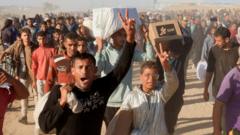Health experts warn that the suspension of USAID funding could lead to increased transmission of infectious diseases, stifling the progress made in global health initiatives.**
Global Health Experts Alarmed by US Aid Suspension**

Global Health Experts Alarmed by US Aid Suspension**
Concerns escalate over potential disease outbreak as USAID faces significant cuts under the Trump administration's freeze on overseas aid.**
Experts in global health are raising urgent alarms following the U.S. government's announcement to temporarily suspend billions in overseas aid through the United States Agency for International Development (USAID). This funding freeze coincides with substantial cuts to USAID's workforce and aids as part of a "review" initiated by President Donald Trump's administration, aimed at realigning financial support with the “America First” strategy.
The administration has specifically criticized USAID, asserting that the agency’s expenditures are unjustified and wasteful. However, public health specialists emphasize that these cuts could exacerbate the global health crisis by facilitating the spread of diseases and hindering the development of vital vaccines and treatments. USAID doesn't just manage health initiatives directly; it also backs various non-governmental organizations (NGOs) that implement essential health services worldwide, which are now left in disarray due to the funding interruption.
Dr. Tom Wingfield, a tuberculosis and social medicine expert, cautioned about the far-reaching implications of dismantling USAID's funding, highlighting the agency's critical role in combating diseases like tuberculosis (TB) and ensuring access to clean water and hygiene. With approximately 1.3 million TB-related fatalities annually, he argues that a reduction in care could lead to increased transmission rates, resulting in preventable deaths.
Similar fears are echoed regarding HIV care, managed largely by NGOs that provide essential anti-retroviral treatments. Disruption in medication supply could see HIV infections rising, undoing years of progress in controlling the virus and raising the risk of its transmission.
Organizations such as Frontline AIDS report profound impacts, with their partners in over 100 countries struggling to maintain services, resulting in layoffs and halted treatment programs. The communication ambiguity surrounding which programs are exempt from the freeze has added to the chaos, leaving many in vulnerable communities uncertain and discouraged.
Experts point to the erosion of trust as a significant consequence of the cutbacks. Once reliable health systems may struggle to regain credibility, complicating their ability to manage and respond effectively to infectious diseases. The freeze also jeopardizes critical international clinical trials needed for developing new treatments, particularly for diseases like malaria and HIV, which rely heavily on USAID funding.
As noted by Professor Rosa Freedman, if the funding halt persists, it could prevent advancements in immunization efforts, risking the resurgence of diseases thought to be under control. The interconnectedness of modern societies means a potential outbreak could spread swiftly, causing a ripple effect across global health systems. The long-term effects of these policy changes remain to be seen but could undoubtedly reshape the landscape of global health cooperation and strategy.
The administration has specifically criticized USAID, asserting that the agency’s expenditures are unjustified and wasteful. However, public health specialists emphasize that these cuts could exacerbate the global health crisis by facilitating the spread of diseases and hindering the development of vital vaccines and treatments. USAID doesn't just manage health initiatives directly; it also backs various non-governmental organizations (NGOs) that implement essential health services worldwide, which are now left in disarray due to the funding interruption.
Dr. Tom Wingfield, a tuberculosis and social medicine expert, cautioned about the far-reaching implications of dismantling USAID's funding, highlighting the agency's critical role in combating diseases like tuberculosis (TB) and ensuring access to clean water and hygiene. With approximately 1.3 million TB-related fatalities annually, he argues that a reduction in care could lead to increased transmission rates, resulting in preventable deaths.
Similar fears are echoed regarding HIV care, managed largely by NGOs that provide essential anti-retroviral treatments. Disruption in medication supply could see HIV infections rising, undoing years of progress in controlling the virus and raising the risk of its transmission.
Organizations such as Frontline AIDS report profound impacts, with their partners in over 100 countries struggling to maintain services, resulting in layoffs and halted treatment programs. The communication ambiguity surrounding which programs are exempt from the freeze has added to the chaos, leaving many in vulnerable communities uncertain and discouraged.
Experts point to the erosion of trust as a significant consequence of the cutbacks. Once reliable health systems may struggle to regain credibility, complicating their ability to manage and respond effectively to infectious diseases. The freeze also jeopardizes critical international clinical trials needed for developing new treatments, particularly for diseases like malaria and HIV, which rely heavily on USAID funding.
As noted by Professor Rosa Freedman, if the funding halt persists, it could prevent advancements in immunization efforts, risking the resurgence of diseases thought to be under control. The interconnectedness of modern societies means a potential outbreak could spread swiftly, causing a ripple effect across global health systems. The long-term effects of these policy changes remain to be seen but could undoubtedly reshape the landscape of global health cooperation and strategy.






















